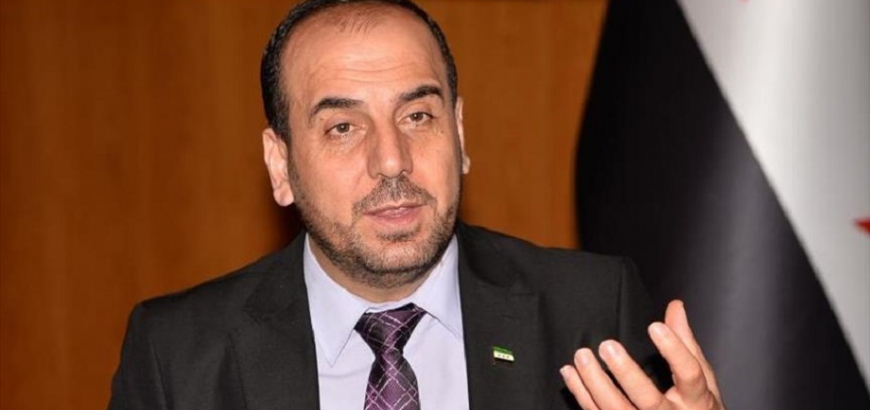Nasr al-Hariri, head of the Syrian opposition delegation to Geneva, said that the regime’s proposal for political transition, the formation of a national unity government, is not mentioned in UN resolutions, adding that the opposition would respond this week to UN envoy Staffan de Mistura’s working paper.
Hariri said that the opposition was serious about reaching a political solution, and that the negotiating delegation and committee were not driven by self-interest but were seeking a just political solution that would achieve “real peace in Syria.” He added that the opposition reacted positively to De Mistura’s adoption of the Geneva Declaration and Security Council resolutions 2118 and 2254 as the basis for talks on political transition.
At a press conference following Friday’s session, Hariri discussed the first round of talks and said “first, (de Mistura) talked about the clear international resolutions which discuss political transition, and the envoy welcomed these resolutions. This means that it begins positively.”
Hariri added that in the previous Geneva talks, there was a dispute over the agenda and that the Syrian regime in 2014 refused to discuss any issue except that of the terrorism which it created, in order to circumvent the demands of the people. As for Geneva 2016, Hariri said it did not move beyond discussing working papers and rules of procedure.
He praised de Mistura's focus on the agenda and said "when the first point of discussion is the political transition and transitional rule, I think this is a positive sign."
Responding to a question about the political solution’s stages, he said, “it is well-known that the first step that must be completed is the political transition.”
Hariri stressed that the opposition wanted a new constitution and free and fair elections based on the highest international standards, but that the issue was bound by time and space.
Regarding the opposition's vision of the political transition and their view of the national unity government proposed by the regime and its allies, Hariri said the regime wants to maintain the status-quo and include Bashar al-Assad and the regime's military and security institutions in the political transition.
He continued: “We are not waiting for the regime because it does not want any change in Syria. We have not called for a transitional governing authority, we have demanded the implementation of the international resolutions and the Geneva declaration which talk about the political transition process beginning with the formation of a transitional governing authority with full executive powers and with a mechanism for mutual compliance in which the regime and the opposition and others participate — of course, those who have not stained their hands with blood and have not carried out crimes.”
He noted that as for the regime's proposal for a national unity government, "there is no international resolution and no statement from an international group, nor any statement from the Security Council, not any statement from a country about the notion of a national unity government. And this is all the regime is talking about.”
About the lower limits of what they want to leave the negotiations with, he said that, “the maximum I hope for is that we reach a political solution as soon as possible. The minimum is to put what efforts we have toward reaching any positive results in the first round. I believe that if we can reach with the international envoy a joint understanding of the path and the agenda which can begin in the coming rounds of talks, this, in my view, is something good and positive.”
Regarding their conduct in the talks in confronting the conduct of the regime evading its responsibilities, he said: “Our conduct is what represents our positions and what we have done on the ground. We have come to the talks and we will interact with the international envoy. Now we are discussing our proposals and adding our proposals and we are continuing the transition process until we carry out what we need to. I am not saying if the process will succeed or not but we came here to try to make it succeed.”
Regarding America and its role in the negotiations, he said: “America is a great country and a permanent member of the Security Council. The Syrian people are paying a large and painful price for the disastrous mistakes of the administration of (former President Barack) Obama which placed red lines and then allowed the Assad regime to pass over them and made a nuclear deal with Iran and turned a blind eye to its interventions and allowed them to enter into Syria.”
He added that, “the opposition has presented itself as a real and active partner on the ground to fight terrorism,” adding he hoped for “international support to counter these efforts and that America has a prominent role in putting an end to Iran’s interventions and its Satanic role in the region, because it is otherwise not possible to restore security and stability — not just to Syria but to the whole region.”
He stressed that they were calling for support for US efforts to place Iranian Revolutionary Guard militias on the terrorist list.
Regarding the advance of the Free Syrian Army in the northern city of al-Bab recently casting a shadow on the talks, he said: “Today the impressive successes which the heroes of the Free Syrian Army are achieving and the prominent role played by Turkey in supporting the battle strengthens the negotiating position and strengthens the morale not just among the fighters on the ground but among the Syrian people because these areas that have been liberated are ready for the return of refugees to their homes another time.”
This article was translated and edited by The Syrian Observer. Responsibility for the information and views set out in this article lies entirely with the author.


